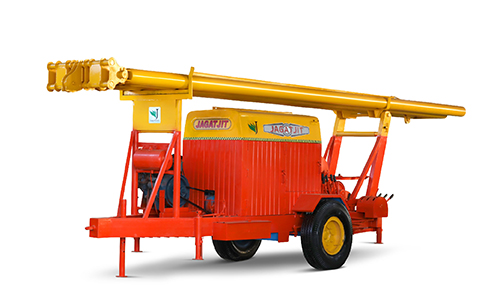Project Report For Boring Machine
Introduction
Project Report For Boring Machine is as Follows.
A boring machine is a machine tool that is used to create a hole of a specific diameter and depth in a variety of materials, such as metal, wood, and concrete. These machines come in a wide range of sizes and designs, from small hand-held tools to large industrial machines. In India, boring machines are used in a variety of industries, including construction, manufacturing, and mining.
One of the most common types of boring machines used in India is the portable boring machine. These machines are designed to be lightweight and easy to transport, making them ideal for use on construction sites, in workshops, and in other locations where space is limited. They are often powered by electric or gasoline engines and can be used to bore holes in a variety of materials, including concrete, wood, and metal.

Another type of boring machine commonly used in India is the floor boring machine. These machines are designed to be used on large construction sites, such as those involved in building bridges, tunnels, and other infrastructure projects.
They are typically much larger than portable boring machines and are powered by diesel or electric engines. Floor-boring machines are used to bore holes in concrete, rock, and other hard materials, and can be used to create large, deep holes.
Get Completely Custom Bankable Project Report
In addition to portable and floor boring machines, there are also other types of boring machines used in India. For example, horizontal boring machines are used to bore holes in large, flat surfaces, such as those found in bridges and other infrastructure projects. These machines are typically much larger than portable boring machines and are powered by diesel or electric engines.
Another type of boring machine used in India is the jig boring machine. These machines are used to create precise, accurate holes in a variety of materials, including metal and wood. They are often used in manufacturing and other industrial settings and are typically more expensive than portable or floor-boring machines.
Market Potential of Boring Machine
Tunnel Boring Machine Market was valued at $6.11 billion in 2021 and is expected to reach $10.55 billion by 2029. Tunnel Boring Machine Market will grow at a CAGR of 7.06% during the forecast period.
Expenses

Product Cost Breakup

Reveneue Vs Expenses

Market Trend

A tunnel boring machine (TBM) is a machine that excavates circular tunnels through different soil and rock strata. They are capable of piercing hard rock, sand, and virtually any other material. The tunnel diameter ranges from a metre (created with micro-TBMs) to nearly 16 metres, and it is designed to bore through anything from hard rock to sand. Tunnels less than a metre in diameter are typically built without trenches or with horizontal directional drilling rather than with TBMs.
Tunnel Boring machines are replacing both drill and blast operations in rock and traditional hand mining in soil. They can be designed to bore through a variety of materials, including hard rock and sand. Tunnel boring machines are used to replace drilling and blasting (D&B) methods in rock and traditional hand mining in soil.
TBMs can also be designed to excavate noncircular tunnels such as u-shaped or horseshoe tunnels, as well as square or rectangular tunnels. As it grinds its way along, the tunnel boring machine must be protected from the material that falls around it. Pipes, grout injection, rock bolts, and freezing used over or in front of the cutterhead are examples of support systems used to protect the TBM from fault zones.
Boring machines are used in a variety of infrastructure and construction projects, including the construction of tunnels, metro rail systems, and underground utilities. They are also used in the mining and oil and gas industries. The demand for these machines is expected to increase as more infrastructure and construction projects are undertaken in the country.
